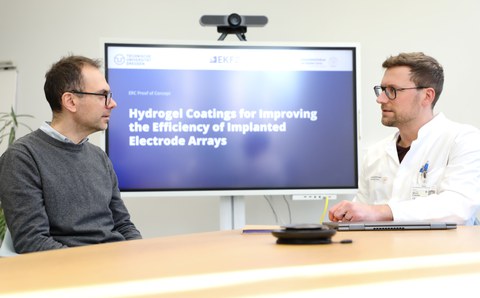Jan 23, 2025
Treating nervous system injuries with bioelectronic implants: Ivan Minev receives ERC Proof of Concept Grant

Prof Dr Ivan Minev (left) and PD Dr med. habil. Witold Polanski (right).
For his innovative research project “COATARRAY”, Prof. Ivan Minev, Else Kröner Fresenius Center (EKFZ) for Digital Health at TUD Dresden University of Technology and Leibniz Institute of Polymer Research (IPF), has been awarded a Proof of Concept Grant by the European Research Council (ERC). The project will develop specialized coatings to fundamentally improve the electrical and mechanical performance of bioelectronic implants. It is funded over a period of 18 months with 150,000 Euros.
Implantable electrode arrays are a key component of neuroprosthetic systems. They are used clinically to restore functions of the nervous system lost through injuries or degenerative diseases. Examples include cochlear implants and deep brain and spinal cord stimulators. However, existing systems have weaknesses. The implants currently used usually consist of metals such as platinum encapsulated in silicone. These materials are characterized by mechanical properties that are very different from the host tissues. This often causes suboptimal tissue integration in the long term and can lead to inflammation and scar formation.
Connecting biological tissue with electrical systems
One promising approach lies in bioelectronic materials that connect biological tissue with electrical systems. “Our special coating is based on a bio-inspired hydrogel, a soft material that consists largely of water. By incorporating conductive polymers, we achieve excellent electrical properties. Thus, our coating has properties similar to those of tissues. We hope that this will have a profound effect on establishing a good biological and electrical interface,” explains Ivan Minev, Professor of Electronic Tissue Technologies at EKFZ for Digital Health at TUD and Leibniz-IPF. He has already previously received prestigious ERC funding for his research – a Starting Grant and a Consolidator Grant.
From laboratory to clinical application
The project includes extensive tests to characterize the new coating and its subsequent investigation in preclinical studies. Priv.-Doz. Dr. med. habil. Witold Polanski, an experienced neurosurgeon at Dresden University Hospital, will contribute valuable clinical expertise: “This funding enables us to bridge the gap between basic research and clinical application. COATARRAY has the potential to significantly increase the performance and durability of implanted electrode arrays – which would be of great benefit to patients in particular.”
Market potential will be analyzed and regulatory requirements are examined at an early stage of the project. Experts from the Regulatory Affairs Office of the EKFZ for Digital Health provide support in this process. The joint goal is to bring new medical devices into clinical use as fast as possible. In addition to regulatory requirements, potential patents and subsequent commercialization are also considered early on. The TUD|Excellence Center for Innovation, Transfer and Entrepreneurship (TUD|excite) provides support in this area. The Swiss start-up Neurosoft Bioelectronics will supply some of the electrode array designs on which the coating will be tested.
“I am grateful for the opportunity to further advance our translational efforts in bioelectronics through ERC funding. Our approach could not only improve existing neuro-prosthetic systems, but also enable completely new treatment methods. I hope that our project will help to sustainably improve the quality of life of patients in the future,” says Professor Minev.
The project is being carried out in collaboration between EKFZ for Digital Health, the Department of Neurosurgery at Dresden University Hospital and with the support of the TUD|Excellence Center for Innovation, Transfer and Entrepreneurship (TUD|excite). It is funded over a period of 18 months with 150,000 Euros.
About the person
Professor Minev has been Professor of Electronic Tissue Technologies at the Faculty of Medicine at TUD Dresden University of Technology since June 2023. The professorship was jointly established by the Leibniz Institute of Polymer Research (IPF) and the EKFZ for Digital Health in Dresden. Previously, Ivan Minev was Professor of Intelligent Healthcare Technologies at the University of Sheffield (UK). From 2016 to 2019, he was a research group leader at the Biotechnology Center BIOTEC at TUD. Between 2012 and 2016, he was a postdoctoral researcher at the Center for Neuroprosthetics at the Swiss Federal Institute of Technology in Lausanne (EPFL), working on the development of soft implants for the nervous system. He completed his doctorate at the University of Cambridge (UK) in 2012.
About the ERC Proof of Concept Grants
The Proof of Concept (PoC) Grant is a funding line of the European Research Council (ERC) that can be awarded in addition to the main funding lines (Starting, Consolidator, Advanced and Synergy Grant). It is aimed exclusively at researchers who already hold an ERC grant and now wish to explore the commercial or societal potential of their pioneering research projects. PoC grants are endowed with 150,000 Euros for a maximum of 18 months. The grant scheme is part of the EU’s research and innovation program, Horizon Europe. In the final round of the 2024 ERC PoC grant competition, 134 projects will receive support, bringing the total number of grants awarded under the 2024 work program to 245 worth 36.75 million Euros.
Else Kröner Fresenius Center (EKFZ) for Digital Health
The EKFZ for Digital Health at TU Dresden and University Hospital Carl Gustav Carus Dresden was established in September 2019. It receives funding of around 40 million euros from the Else Kröner Fresenius Foundation for a period of ten years. The center focuses its research activities on innovative, medical and digital technologies at the direct interface with patients. The aim here is to fully exploit the potential of digitalization in medicine to significantly and sustainably improve healthcare, medical research and clinical practice.
Contact
EKFZ for Digital Health
Anja Stübner and Dr. Viktoria Bosak
Public Relations
Tel.: +49 351 – 458 11379
digitalhealth.tu-dresden.de
